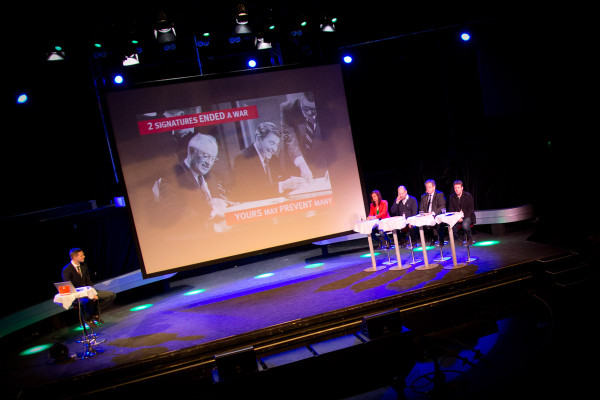Day 2 of the Oslo civil society forum brought with it much important and new information and ended on a wave of inspiration and joy that will surely carry the delegates back to their countries ready to redouble their efforts to eradicate nuclear weapons.
During the day the issues dealt with covered how to go about getting a treaty to ban nuclear weapons and the panellists presented possible precedents and useful examples such as the creation of the International Criminal Court and the treaties to ban cluster weapons and other weapons of mass destruction.
In the afternoon attention moved towards how to build a social movement and for this the experience was sought of experts in the use of new communication media: e-mail and social networks. ‘Don’t be afraid to experiment with your messages because there’s no such thing as the perfect message,’ was a conclusion. A message that resonates with one person will be instantly deleted by someone else. Results from the Obama campaign team, represented by Amelia Showater showed that during the last US election it was impossible to predict what messages would work best.
And as the forum started to draw to a close, the energy started to rise in the auditorium as young delegates from Costa Rica, Chile, Brazil, South Africa, Nigeria, Sweden and Germany presented their activities.
Finally, Thomas Nash of the organisation Article 36 in the UK was invited to wrap up the weekend.
We made this happen. No matter what goes down in the conference in the next two days, we should remember that.
We’ve also got the P5 on the run. Yesterday Gry Larsen, the Deputy Minister, said that the P5 weren’t very convincing with their arguments. Well you can say that again! Their diplomats have even got themselves into a spin on Twitter. You know, I bet some of them wish they were here so that they could try to control what’s going on. Because they can see that once you start to focus on the humanitarian consequences of nuclear weapons and the environmental consequences, there’s really only one road forward and that road leads straight to a ban on nuclear weapons.
Maybe they think that by ignoring us somehow we’ll go away but I have to say that from what I’ve been hearing over the last couple of days I think that’s pretty unlikely.
Maybe they think we’ll be discouraged by their boycott or that we’ll see it as some kind of failure but from what I’m hearing it’ll probably actually make us feel more confident that we can go ahead and get a treaty banning nuclear weapons without them.
So I’m kind of feeling like the plan might be working. Of course we shouldn’t be surprised that we can have this kind of influence. It’s true that this weekend has felt like something new with all these friendly, groovy young Norwegians, all this great stuff, but I also feel like it’s felt like just the latest step in a history of effective civil society mobilisation to outlaw and eliminate weapons of mass destruction.
…
But now I guess the most important thing is the role that each and every one of us can play in banning nuclear weapons. We know that this humanitarian approach to disarmament works. It’s helped us ban weapons before, it’s helped us ban nuclear testing and it’s going to help us ban nuclear weapons.
I think the only thing that can prevent us from getting a ban treaty is if we don’t believe it ourselves. But I think that if we build our campaign respectfully, thoughtfully, inclusively over the coming weeks and months, we’re going to find ourselves in the midst of a process to abolish nuclear weapons before we know it. And I think that once we get going in that process we could be pretty hard to stop.
Now the next stop for ICAN is the humanitarian conference that starts tomorrow and ICAN has an important, different kind of role to play there. We don’t know what may or may not be announced during the conference as the next steps to take this movement forward, but whatever happens I’m convinced that very soon ICAN, together with governments, the Red Cross and Red Crescent movement and other partners, we’re going to be on a fast track towards a new treaty banning nuclear weapons.”
For this observer what differentiated this meeting from others before it was the presence of so many young people. Yesterday in the session on the humanitarian consequences one of the questions to a more mature panel concerned how room could be given for younger people to express themselves. From what we’ve seen here young people are already doing it. It’s true that their presence here is partly due to the great sponsorship achieved by the organisers, but this doesn’t detract from the fact that these activists are doing great work.
On the stage, at the end of the forum all the organisers and volunteers were standing there to receive the standing ovation they richly deserved for all the work they did over the weekend. I doubt if any of them were over 30! And this we can take as our greatest hope for the future.
This journey to nuclear abolition is going to be a hard one and today it might seem impossible, but the great and hopeful thing is that sometimes the impossible happens. After all let’s not forget that the Berlin Wall fell in the blink of an eye, unpredicted by anyone in the West.






